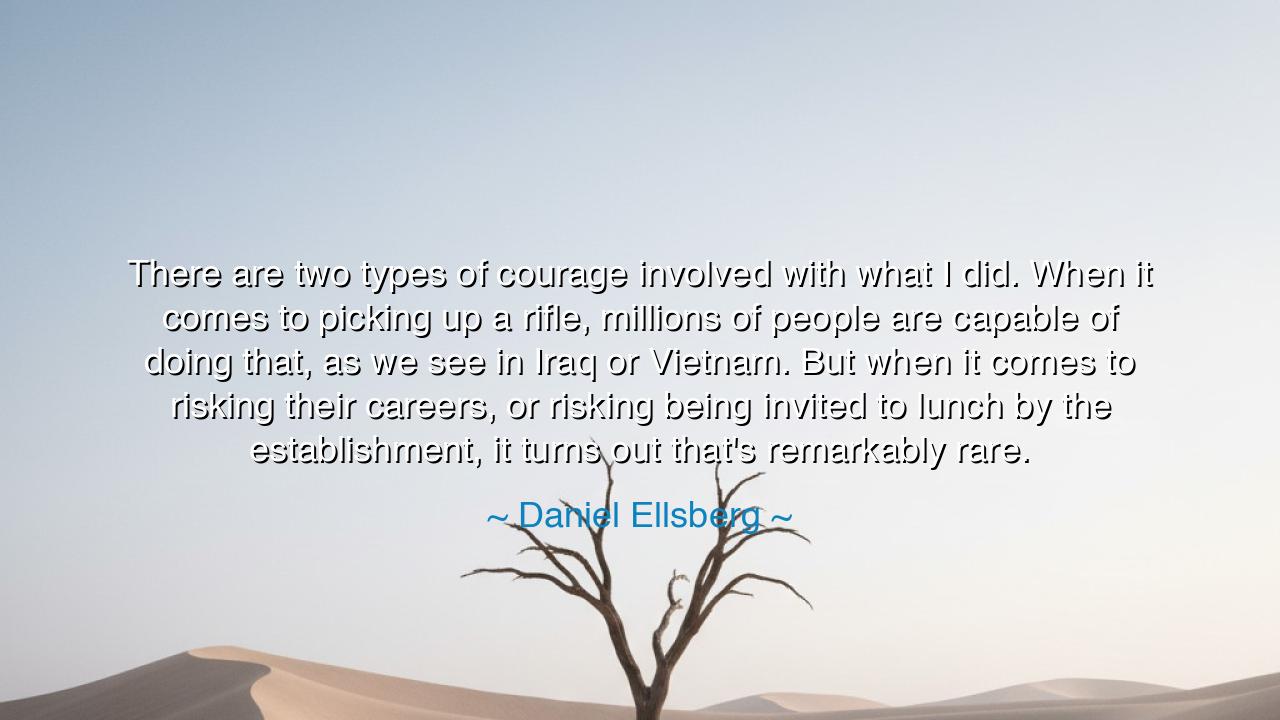
There are two types of courage involved with what I did. When it
There are two types of courage involved with what I did. When it comes to picking up a rifle, millions of people are capable of doing that, as we see in Iraq or Vietnam. But when it comes to risking their careers, or risking being invited to lunch by the establishment, it turns out that's remarkably rare.






“There are two types of courage involved with what I did. When it comes to picking up a rifle, millions of people are capable of doing that, as we see in Iraq or Vietnam. But when it comes to risking their careers, or risking being invited to lunch by the establishment, it turns out that's remarkably rare.” So spoke Daniel Ellsberg, the man who, in 1971, revealed the Pentagon Papers—truths long hidden from the people, exposing the deceit and manipulation behind the Vietnam War. His words are both confession and revelation, a mirror held to the soul of humanity. For he reminds us that while the courage to face death is often praised, there exists another, quieter, rarer form of bravery: the courage to face disgrace, exile, and moral isolation in the name of truth.
This quote arises from Ellsberg’s own experience as a whistleblower—a man who once served within the very heart of power, and then chose to defy it. He saw firsthand how systems reward loyalty and punish conscience. To speak the truth was to risk not only his career but his reputation, his freedom, and his place in the circles of comfort and influence. He did not face the enemy across a battlefield, but the far subtler enemy of conformity—the fear of being cast out. In that act, Ellsberg revealed a truth the ancients knew well: that moral courage is rarer and more demanding than physical courage, for it requires the soul to stand alone against the world.
The ancients themselves revered this form of bravery. Socrates, accused of corrupting the youth of Athens, refused to recant his teachings even under threat of death. He could have chosen silence and lived; instead, he chose integrity and drank the hemlock. Like Ellsberg, he defied the establishment not with arms, but with truth. And in doing so, he proved that the highest form of courage is not found in the clash of armies, but in the steadfastness of the individual who chooses conscience over comfort. The soldier’s courage faces bullets; the thinker’s courage faces solitude. Both are noble, but one leaves the body wounded, the other the soul.
Ellsberg’s words strike at the heart of a modern hypocrisy: we celebrate heroes who fight wars, but we often scorn those who fight lies. We build statues to warriors but imprison the whistleblower. Why? Because it is easy to honor courage that serves the nation’s pride, but it is far harder to honor the courage that confronts the nation’s guilt. When Ellsberg risked his livelihood and liberty to release the Pentagon Papers, he did not fight an external foe—he fought the internal machinery of deception. That kind of rebellion, quiet and moral, threatens the comfort of the powerful and reveals the weakness of the compliant.
To the thoughtful listener, Ellsberg’s quote is a call to examine what kind of courage we possess. Many believe they would fight bravely in war, yet how many would risk their career to defend what is right? How many would speak truth when their community falls silent, or lose friends rather than lose integrity? This is the test Ellsberg describes—the crucible of moral strength. For it is not only in battlefields that the soul is tested; it is tested in meetings, in classrooms, in the daily choices between silence and speech. The establishment he speaks of is not only government—it is any circle that prizes comfort over conscience.
The lesson, then, is this: true courage does not always roar on the field of war; sometimes, it whispers in the chambers of power or stands quietly before a crowd that mocks. The noble soul must learn both forms of bravery—the strength to face external danger and the strength to face internal judgment. When you witness injustice, speak, even if your voice trembles. When truth costs you position or favor, pay the price gladly. Remember that to live safely at the cost of truth is to die inwardly, but to live truthfully, even at the cost of safety, is to be truly alive.
So let Daniel Ellsberg’s example burn like a torch in your heart. Dare to see courage not only in the soldier’s march but in the whistleblower’s defiance, the reformer’s persistence, the thinker’s honesty. The first kind of courage preserves the body; the second preserves the soul. And when the world tempts you to trade conscience for comfort, remember his words—and choose to step forward anyway. For the path of moral courage is steep and solitary, but at its summit, one finds the rarest peace of all: the peace of having stood for truth, though the world stood against you.






AAdministratorAdministrator
Welcome, honored guests. Please leave a comment, we will respond soon